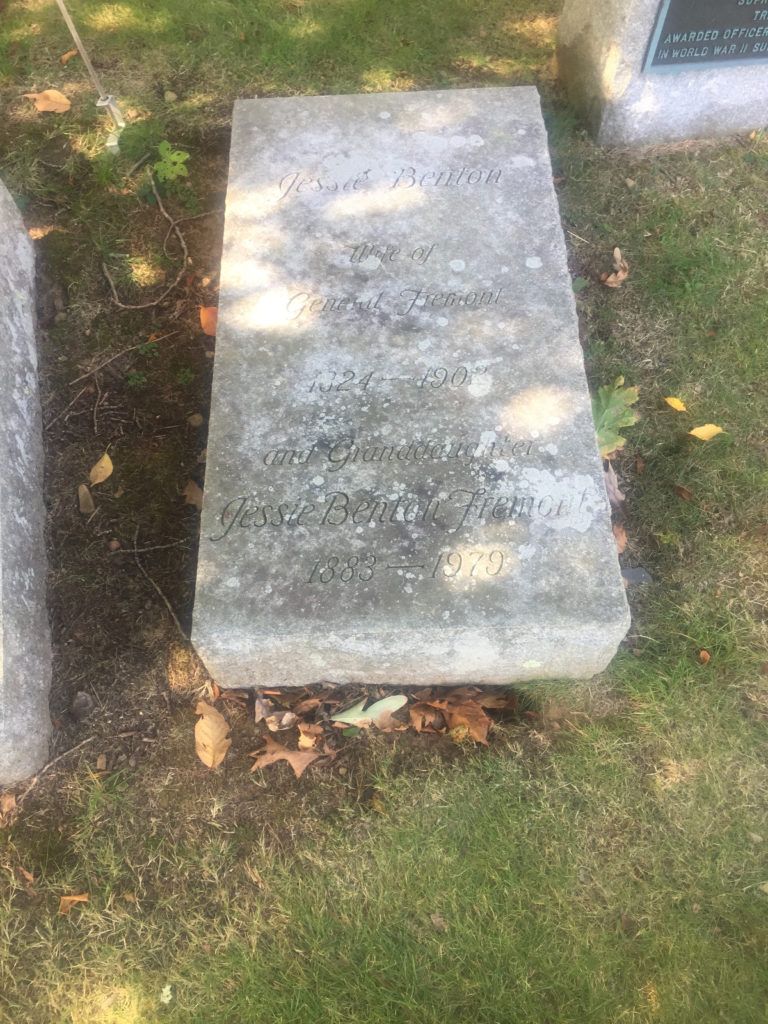Erik Visits an American Grave, Part 918
This is the grave of Jessie Benton Fremont.

Born in 1824 outside of Lexington, Virginia, Jessie Benton was the daughter of the legendary Missouri senator Thomas Hart Benton. The reason she was born in Virginia is that her mother went to her parents for the birth. Benton had wanted a son and was disappointed she was a daughter. So he decided to raise her as a son, in the sense that she was his intellectual heir. He had her accompany him on his trips. He introduced her to leading politician. He made sure she knew all aspects of all the political debates of the day. By the time she was a teen, she was translating government documents. So this was a tremendously interesting and extremely capable individual. She so wanted to fill this role that as a teen, she cut her hair as short as a boy’s to embrace the role. This was a bridge too far for daddy, who told her it was time to start acting like a woman.
Had Jessie Benton been a boy, she would have been a senator. But she was not. Moreover, she greatly disappointed her father when she agreed to marry the explorer John C. Fremont. Thomas Hart Benton saw right through Fremont and realized that he was basically a loser and below her station and ability. This was true. She was also 17 years old. But she insisited on marrying him and Benton didn’t stand in the way in the end.
The marriage did make her somewhat famous. Fremont was a pretty important person at the time. But he was also downwardly mobile to say the least. The only thing the guy was remotely good at was wandering around in the West and promoting himself based on that. Everything else, he was a total failure. This meant declining money and comfort for his wife. She followed him around the West, where he was always getting into trouble, including being court-martialed for his actions in California during the Mexican War. She became one of the first major women of San Francisco, a nearly all-male cities where few white women outside of prostitutes lived in the early days.
When Fremont became the Republican presidential candidate in 1856, Jessie was basically his campaign manager. This was the kind of thing she was born for. He did not win or even come close but most certainly laid the groundwork for Lincoln’s run in 1860. At campaign stops, she was by far the more popular speaker of the two, with people calling for her to speak from the audience. When the South committed treason in defense of slavery, there was significant support in California to join them. Jessie was one of the leaders of Unionist forces in the state and she played a critical role in organizing the leading Union men of the state in heading off the secessionists. When Lincoln fired her husband for issuing his own emancipation edict in Missouri, she traveled alone to Washington to plead for his job, but Lincoln refused to give in, although he did meet with her.
By the 1870s, John was such a loser, consistently engaging in the worst possible financial investments to get rich, that Jessie had to write to support the family. Luckily, she was good at this. Since she had been central to the nation’s politics as the ultimate insider from the time she was a girl, she had a lot to say. Among her books was a travel narrative about the West, a book about the Civil War, and a book about her husband’s expeditions. They mostly continued living in the West, primarily California, but also in Arizona when John was governor of the territory, to the extent that he actually spent time there instead of neglecting his duties.
In 1880, a newspaper writer summed up the popular thought about Jessie Benton Fremont. He said, “It was no great disappointment,” a newspaper writer said in 1880, that John was not elected, “but I think that we all regret that his wife should never have been Mrs. President…..she is in a high sense a masculine woman. Her powers are those we call masculine, as representing greater strength. If she had the fortune to be born a man, she would beyond doubt have achieved a place among the controlling spirits of this country from which the limitations of her sex have debarred her.” This language is worth a good bit of analysis on its own.
She spent her later years in Los Angeles as a widow. She had a nice home there and continued to write. She died in 1902, at the age of 78.
Jessie Benton Fremont is buried in Rockland Cemetery, Sparkill, New York. Or is she? There is some debate on this. The marker is here. But she was at least initially buried in Los Angeles and there’s a marker there still too. Who knows. I’m not going to be digging around to confirm! This is good enough.
If you would like this series to visit other women who wrote about the 19th century American West, you can donate to cover the required expenses here. Susan Shelby Magoffin is in St. Louis and Georgiana Kirby is in Santa Cruz, California. Previous posts in this series are archived here.


